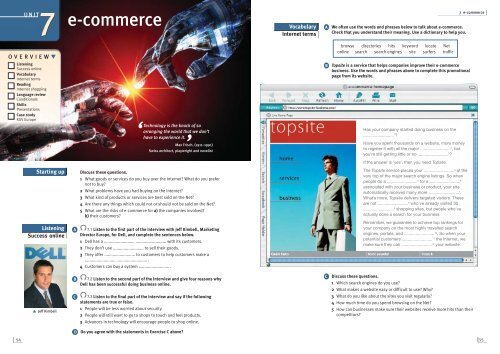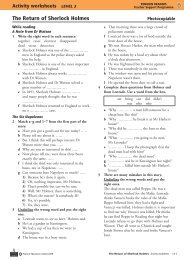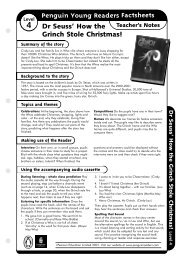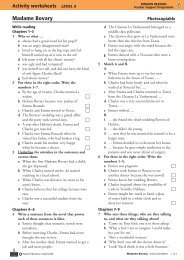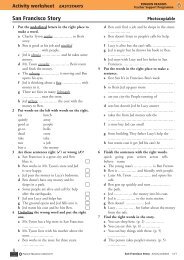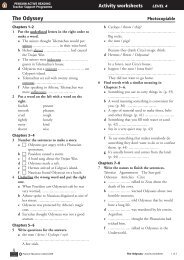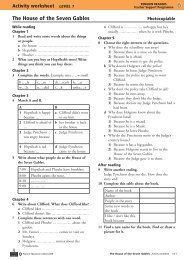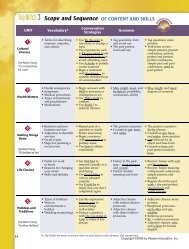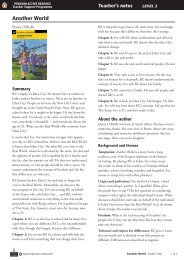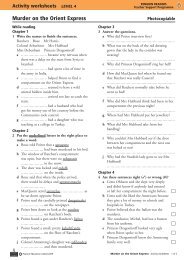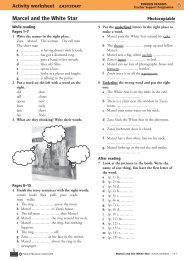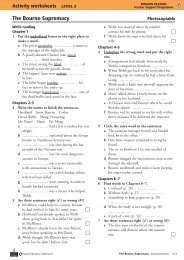Market Leader Upper Intermediate Unit 7 - Longman Japan
Market Leader Upper Intermediate Unit 7 - Longman Japan
Market Leader Upper Intermediate Unit 7 - Longman Japan
Create successful ePaper yourself
Turn your PDF publications into a flip-book with our unique Google optimized e-Paper software.
54<br />
7<br />
UNIT<br />
OVERVIEW▼<br />
Listening<br />
Success online<br />
Vocabulary<br />
Internet terms<br />
Reading<br />
Internet shopping<br />
Language review<br />
Conditionals<br />
Skills<br />
Presentations<br />
Case study<br />
KGV Europe<br />
e-commerce<br />
‘<br />
Technology is the knack of so<br />
arranging the world that we don’t<br />
have to experience it.<br />
Max Frisch, (1911–1991)<br />
Swiss architect, playwright and novelist<br />
Starting up Discuss these questions.<br />
1 What goods or services do you buy over the Internet? What do you prefer<br />
not to buy?<br />
2 What problems have you had buying on the Internet?<br />
3 What kind of products or services are best sold on the Net?<br />
4 Are there any things which could not or should not be sold on the Net?<br />
5 What are the risks of e-commerce for a) the companies involved?<br />
b) their customers?<br />
Listening<br />
Success online<br />
▲ Jeff Kimbell<br />
A<br />
B<br />
C<br />
D<br />
7.1 Listen to the first part of the interview with Jeff Kimbell, <strong>Market</strong>ing<br />
Director Europe, for Dell, and complete the sentences below.<br />
1 Dell has a .......................... .......................... with its customers.<br />
2 They don’t use .......................... to sell their goods.<br />
3 They offer .......................... to customers to help customers make a<br />
.......................... .......................... .<br />
4 Customers can buy a system .......................... .<br />
7.2 Listen to the second part of the interview and give four reasons why<br />
Dell has been successful doing business online.<br />
7.3 Listen to the final part of the interview and say if the following<br />
statements are true or false.<br />
1 People will be less worried about security.<br />
2 People will still want to go to shops to touch and feel products.<br />
3 Advances in technology will encourage people to shop online.<br />
Do you agree with the statements in Exercise C above?<br />
‘<br />
Vocabulary<br />
Internet terms<br />
A<br />
B<br />
We often use the words and phrases below to talk about e-commerce.<br />
Check that you understand their meaning. Use a dictionary to help you.<br />
browse directories hits keyword locate Net<br />
online search search engines site surfers traffic<br />
Topsite is a service that helps companies improve their e-commerce<br />
business. Use the words and phrases above to complete this promotional<br />
page from its website.<br />
Has your company started doing business on the<br />
.......................... 1 ?<br />
Have you spent thousands on a website, more money<br />
to register it with all the major .......................... 2 , but<br />
you’re still getting little or no .......................... 3 ?<br />
If the answer is ‘yes’, then you need Topsite.<br />
The Topsite service places your .......................... 4 at the<br />
very top of the major search engine listings. So when<br />
people do a .......................... 5 for a .......................... 6<br />
associated with your business or product, your site<br />
automatically receives many more .......................... 7 .<br />
What’s more, Topsite delivers targeted visitors. These<br />
are not .......................... 8 who’ve already visited 35<br />
.......................... 9 shopping sites, but people who’ve<br />
actually done a search for your business.<br />
Remember, we guarantee to achieve top rankings for<br />
your company on the most highly travelled search<br />
engines, portals, and .......................... 10 . So when your<br />
potential customers .......................... 11 the Internet, we<br />
make sure they can .......................... 12 your website.<br />
7 e-commerce<br />
C Discuss these questions.<br />
1 Which search engines do you use?<br />
2 What makes a website easy or difficult to use? Why?<br />
3 What do you like about the sites you visit regularly?<br />
4 How much time do you spend browsing on the Net?<br />
5 How can businesses make sure their websites receive more hits than their<br />
competitors?<br />
55
7 e-commerce<br />
56<br />
5<br />
10<br />
15<br />
20<br />
25<br />
30<br />
35<br />
40<br />
45<br />
50<br />
55<br />
60<br />
Reading<br />
Internet<br />
shopping<br />
By Neil Buckley<br />
Pets.com; Webvan; Boo.com.<br />
The road to the online<br />
retailing future is littered<br />
with the wrecks of<br />
Internet start-ups once<br />
seen as the pioneers of a<br />
retailing revolution.<br />
The shape of e-tail,<br />
however, is very different<br />
from what was predicted<br />
a few years ago. Apart<br />
from Amazon and eBay –<br />
the web’s biggest forum<br />
for buying and selling,<br />
though it is an auction<br />
house not a retailer –<br />
most of the biggest online<br />
retailers are not Internet<br />
start-ups but traditional<br />
shop or mail-order<br />
groups. Retailers have<br />
brought their investment<br />
capacity and trusted<br />
brand names to bear on<br />
Internet shopping - thus<br />
boosting public<br />
confidence. Many have<br />
integrated online sales<br />
into a ‘multichannel’<br />
strategy that may link a<br />
website, shops and a mailorder<br />
catalogue.<br />
‘There was a time when<br />
everybody said the<br />
Internet was going to<br />
steal purchases from<br />
shops. But the opposite is<br />
happening: multichannel<br />
retailing is the reality<br />
today,’ says Darrell Rigby,<br />
head of the global retail<br />
practice at Bain & Co, the<br />
management consultants.<br />
‘Many classic bricks-andmortar<br />
retailers actually<br />
started making money on<br />
their online operations<br />
long before Amazon did.’<br />
A prime example of the<br />
fusion of the online and<br />
so-called ‘offline’ retail<br />
worlds is Amazon itself.<br />
The company has<br />
expanded well beyond its<br />
roots as a seller of books<br />
and CDs, acting as an<br />
online mall selling everything<br />
from gourmet foods<br />
to clothing. Evolving<br />
from pure retailer to<br />
‘retail platform’, it now<br />
conducts its online<br />
A<br />
B<br />
65<br />
70<br />
75<br />
80<br />
85<br />
90<br />
95<br />
100<br />
What’s the difference between a ‘bricks and mortar’ and an ‘online’ retailer?<br />
Can you give an example of each?<br />
What do you know about these companies: Amazon, eBay, Sears Roebuck?<br />
Internet shopping – the sequel<br />
commerce in partnership<br />
with bricks-and-mortar<br />
retailers such as Target,<br />
Nordstrom, Borders and<br />
Circuit City.<br />
That blending of online<br />
and offline is offering<br />
consumers new ways to<br />
shop. They may research<br />
and order their purchase<br />
online, but have it<br />
delivered to a nearby<br />
shop - a service offered by<br />
retailers such as Sears<br />
Roebuck and Circuit City<br />
– so as to avoid delivery<br />
charges and allow them<br />
to see or try it on first.<br />
Some of the biggest US<br />
retailers are developing<br />
integrated operations. JC<br />
Penney, the century-old<br />
department store chain,<br />
saw its Internet sales<br />
reach $600m last year. It<br />
offers 200,000 items that<br />
can be delivered to<br />
customers’ homes or any<br />
of its 1,020 shops.<br />
Steve Riordan, a<br />
consultant at AT Kearney,<br />
says traditional<br />
retailers that have not yet<br />
embraced the online<br />
world face heavy<br />
investment and some<br />
tough choices. Are they<br />
going to run online<br />
operations themselves or<br />
outsource them? Do they<br />
105<br />
110<br />
115<br />
120<br />
125<br />
130<br />
135<br />
140<br />
use the same sourcing<br />
model from the same<br />
factories? Do they have<br />
different distribution<br />
centres?<br />
While the US still leads<br />
the way, it does not have a<br />
monopoly on successful<br />
Internet retailers. Tesco,<br />
the British supermarket<br />
chain, has the world’s<br />
biggest online grocery<br />
business. It has helped<br />
Safeway, the third-largest<br />
US supermarket chain,<br />
set up its Internet<br />
operations.<br />
The biggest e-commerce<br />
site in <strong>Japan</strong> is<br />
Rakuten, a home-grown<br />
online shopping mall that<br />
began life in 1997 with<br />
just 13 shops. Today, it<br />
has more than 10,000 and<br />
a share of the<br />
e-commerce market three<br />
times bigger than secondranking<br />
Yahoo <strong>Japan</strong>,<br />
according to a report by<br />
JP Morgan.<br />
Some pure Internet<br />
retailers are also continuing<br />
to grow.<br />
Yoox.com – which sells<br />
end-of-season and<br />
exclusive goods from<br />
designers such as<br />
Armani, Prada and Dolce<br />
& Gabbana - has proved<br />
that designer labels will<br />
145<br />
150<br />
155<br />
160<br />
165<br />
170<br />
175<br />
sell online and that European<br />
e-tailers can succeed<br />
internationally.<br />
It chose to launch in<br />
Europe first, close to the<br />
designers whose goods it<br />
sells. Yoox now sells in<br />
seven languages to 25<br />
countries in Europe,<br />
North America and<br />
<strong>Japan</strong>. Its stylish site –<br />
which it calls an<br />
‘e-concept store’ – enables<br />
shoppers to ‘zoom’ in on<br />
clothes and see them<br />
from different angles, and<br />
includes video and music.<br />
Federico Marchetti, the<br />
Italian former investment<br />
banker who is Yoox’s<br />
founder and chief<br />
executive, says that anyone<br />
selling online does<br />
not just have to get the<br />
technology and orders<br />
right. They also have to<br />
provide fun and entertainment.<br />
‘What we have<br />
been trying to do with<br />
Yoox is build a very nice<br />
customer experience,’ he<br />
says. ‘The online retailer<br />
always has to be doing<br />
something interesting<br />
and different.’<br />
From the Financial Times<br />
E<br />
F<br />
Match the following word partnerships.<br />
1 distribution<br />
2 online<br />
3 designer<br />
4 delivery<br />
7 e-commerce<br />
C Match the summaries below to the first six paragraphs of the article.<br />
a) People mistakenly thought that Internet sales would take sales away from<br />
traditional stores.<br />
b) A large number of Internet companies were unsuccessful.<br />
c) A well-known American retailer is getting an increasing amount of revenue<br />
from online sales.<br />
d) The largest online sellers are well-established businesses.<br />
e) Consumers are taking advantage of the new partnerships by shopping online<br />
but using traditional retailers to collect their goods.<br />
f) Some well-known Internet companies have joined with established<br />
companies to sell a wide range of products.<br />
D Now read the rest of the article and answer the questions below.<br />
1 What issues should traditional retailers consider before going online?<br />
2 What facts show that a) Tesco and b) Rakuten have been highly successful in<br />
selling online?<br />
3 According to Federico Marchetti, what do Internet businesses need to do to<br />
be successful?<br />
a) labels<br />
b) charge<br />
c) retailing<br />
d) centre<br />
5 supermarket<br />
6 shopping<br />
7 auction<br />
8 mail-order<br />
e) catalogue<br />
f) houses<br />
g) chains<br />
h) mall<br />
Check your answers in the article. Complete the following sentences with one<br />
of the word partnerships above.<br />
1 Unless you collect the goods from the retail store, there is an additional<br />
.......................... .<br />
2 Sotheby’s and Christie’s are probably the most famous .......................... in<br />
the world. Their sales of antiques and paintings are legendary.<br />
3 In the US many people spend the whole day at their local ..........................<br />
because it is easy to park and you can buy everything there.<br />
4 Some traditional businesses have found that they can make a lot of money<br />
from .......................... with a small investment in an easy-to-use website.<br />
5 These days many .......................... sell not only food, but also services such<br />
as insurance and banking.<br />
6 Goods with .......................... command premium prices in the shops.<br />
7 From our .......................... just outside Paris we supply a network of<br />
wholesalers across Europe.<br />
8 Many people like the convenience of ordering goods from home using a<br />
.......................... .<br />
G Discuss these statements.<br />
1 All retailers will have to sell online.<br />
2 There is no safe way of buying goods online.<br />
3 Online businesses will never be able to guarantee delivery on time because<br />
they rely on postal services.<br />
4 Some products and services cannot be sold online.<br />
57
7 e-commerce<br />
58<br />
Language review<br />
Conditionals<br />
A Match sentences 1–12 to the six headings below.<br />
promise invitation / request speculating about the future<br />
bargaining reflecting on the past advice / warning / threat<br />
1 They would’ve gone bust if they’d taken his advice.<br />
2 If I were you, I’d redesign your website.<br />
3 We’ll deliver within 24 hours if you order online.<br />
4 We’ll be able to expand if they come up with the finance.<br />
5 If you reduced your price by 8%, we’d increase our order substantially.<br />
6 Your money back if not 100% satisfied.<br />
7 If we go online our overheads will fall.<br />
8 If you would like to apply, call Human Resources on 020 7753 3420.<br />
9 If you order by the end of the month we can give you a discount.<br />
10 I wouldn’t do that if I were you.<br />
11 If we’d had a better website, we’d have attracted more customers.<br />
12 I would be grateful if you would advise your staff as soon as possible.<br />
B<br />
C<br />
There are many different types of conditional sentence:<br />
• First conditional: If we get that designer, we’ll have a winning team.<br />
• Second conditional: If we relaunched our website, we’d get better results.<br />
• Third conditional: If we’d prepared properly, we wouldn’t have lost the contract.<br />
• ‘Zero’ conditional: When markets crash, everyone suffers.<br />
The following are also examples of conditional sentences:<br />
• Lose that password and we’ll never be able to access that file again.<br />
• Tell us what you need to get the job done and you’ll have it.<br />
• Should you need any further information, please contact our helpline.<br />
• Had the market conditions been better, the share offer would have been a success.<br />
• Given time, our factory can meet all those orders.<br />
page 133<br />
Decide whether each of the situations below is a) likely or b) unlikely to<br />
happen to you. Then, tell your partner what you will or would do.<br />
1 you get a pay rise next year 4 you travel abroad next year<br />
2 you win a lot of money 5 you have to give a presentation in English<br />
3 your computer gets a virus 6 your company is taken over by a competitor<br />
Discuss what went wrong in the following situation. Use the notes from the<br />
job list extract below. For example, If they’d set up the site properly, they<br />
wouldn’t have had so many complaints.<br />
ClickShop.com is in the Internet shopping business. In order to save money<br />
when it redesigned its website six months ago, it decided not to employ a<br />
specialist design company. Instead, the work was done by some of its own<br />
employees who had limited experience. Technical problems have now led to<br />
customer complaints, which have impacted on sales.<br />
- set site up properly - plan carefully<br />
- use an expert - not try to cut corners<br />
- allocate a bigger budget - recognise problems earlier<br />
- listen to customer feedback - do more research<br />
Skills<br />
Presentations<br />
▲ Roger Marris<br />
Useful language<br />
A<br />
B<br />
D<br />
Commenting<br />
I think that’s interesting<br />
because ...<br />
I think what this means is ...<br />
E<br />
7 e-commerce<br />
7.4 Roger Marris, Head of Business Development at Smarterwork, gives<br />
a presentation to some customers. Listen to the first extract and answer<br />
these questions.<br />
1 What service does Smarterwork offer?<br />
2 What do these figures refer to? a) 14 b) 60,000 c) 90<br />
3 Who are its two types of users?<br />
7.5 Listen to the second extract and complete the stages in the process.<br />
• The client posts a project.<br />
• Suppliers visit the site and make bids.<br />
• ..........................................................................................<br />
• ..........................................................................................<br />
• The client transfers the fee to a holding account.<br />
• ..........................................................................................<br />
• The task gets completed and the client signs off the work.<br />
• ..........................................................................................<br />
• Smarterwork takes a commission.<br />
7.4 Listen again to the first extract.<br />
1 Which of the following does Roger do at the start of his presentation?<br />
a) introduce himself c) tell a story<br />
b) greet the audience d) ask a question<br />
2 Complete what Roger says at the start of his presentation.<br />
This morning, ................ 1 talk to you about Smarterwork. I’m going to<br />
................ 2 an overview of Smarterwork, then ................ 3 you about<br />
our two types of users and finally ................ 4 C<br />
how it all works. Feel free<br />
to ask any questions you like as we go along.<br />
F<br />
7.5 Listen again to the second extract. Note down the language Roger<br />
uses to introduce the stages in the process. For example, Firstly …<br />
Match these expressions from the presentation to headings in the Useful<br />
language box.<br />
1 Can you just raise your hands? 4 Right. The next thing I’d like to<br />
2 The great thing about the<br />
do is ...<br />
Internet is …<br />
5 As you can see, it outlines the<br />
3 What that means is …<br />
steps involved.<br />
Involving the audience<br />
OK, what is Smarterwork?<br />
How many of you have<br />
heard of ...?<br />
Emphasising<br />
I’d just like to highlight ...<br />
I’d like to stress the<br />
importance of ...<br />
Changing subject<br />
OK, I’ll move on to ...<br />
Turning now to ...<br />
Referring to visuals<br />
Let’s look at the chart.<br />
Let me draw your<br />
attention to the table.<br />
Prepare a three-minute presentation on a subject of your choice. For example,<br />
a product or service, your organisation or institution, or a city you know well.<br />
59
7<br />
CASE STUDY<br />
60<br />
KGV Europe<br />
Background<br />
KGV is a traditional high-street music<br />
retailer. Based in Amsterdam, it has 12 stores<br />
in the Netherlands, three of which are<br />
megastores. Some years ago, it expanded<br />
into the rest of Europe and now owns 65<br />
stores – eight of these are megastores.<br />
The company is at present going through a<br />
difficult period. Over the last three years,<br />
profits have steadily fallen, from e450<br />
million to e290 million. The megastores’<br />
sales have risen by 8%, accounting for 55%<br />
of the company’s turnover, but the increased<br />
revenue has been achieved only by heavy<br />
expenditure on advertising and promotion.<br />
Fierce competition, a narrow product range<br />
and a lack of innovation are some of the<br />
reasons for KGV’s poor performance. The<br />
management are concerned, especially, that<br />
they are not exploiting the opportunities<br />
offered by selling through the Internet.<br />
% of annual sales<br />
KGV CUSTOMER PROFILE<br />
50<br />
40<br />
30<br />
20<br />
10<br />
0<br />
under 30 31–40 41–50 over 50<br />
Age group<br />
<strong>Market</strong> study<br />
A study by KGV’s <strong>Market</strong>ing Department<br />
was recently carried out and it produced the<br />
following findings:<br />
1 It is estimated that, in five years’ time,<br />
70% of all music products will be bought<br />
via the Internet.<br />
2 Sixty-five percent of consumers under the<br />
age of 30 prefer to do their shopping via<br />
the Internet.<br />
3 KGV’s customers would like stores to<br />
provide a wider product range (see chart 1).<br />
4 Average spending per month in KGV’s<br />
medium-sized stores is highest among the<br />
41– 60 age group (see chart 2).<br />
5 Spending on music products by the over-<br />
60 age group will increase significantly in<br />
the next ten years in Europe.<br />
6 The various age groups have clear<br />
preferences as to the type of music they<br />
enjoy and purchase (see chart 3).<br />
7.6 Listen to a conversation between<br />
Michael Johnson, a director of KGV, and<br />
Hanna Driessen, the recently appointed<br />
Financial Director of the company. They are<br />
discussing the company’s strategy before a<br />
forthcoming management meeting about<br />
KGV’s future. Make short notes on the<br />
opinions they express.<br />
CHART 1: Preferences for additional products / services<br />
(% of respondents for each category)<br />
Age 18–40 Age 41 +<br />
spoken word (talking books) 4 44<br />
computer games 62 15<br />
holiday information 35 48<br />
computer software 58 32<br />
banking services 25 12<br />
concert tickets 70 75<br />
g<br />
CHART 2: Average spending per month in a<br />
medium-sized store<br />
60<br />
50<br />
40<br />
30<br />
20<br />
10<br />
0<br />
Task<br />
18–25 26–40<br />
Age<br />
41–60 60+<br />
A You are a member of KGV’s management. In small<br />
groups, prepare and give a presentation for your<br />
colleagues concerning KGV’s future strategy. Your<br />
presentation should consider the following questions:<br />
1 Should KGV keep some of their stores but sell at<br />
least 50% of their goods via the Internet?<br />
2 Should they close all their stores and offer a total<br />
online service? If so:<br />
a) what risks would be involved?<br />
b) how would the costs of the business change?<br />
c) what organisational changes would the<br />
company have to make?<br />
3 Should KGV stay as it is, but follow Hanna’s advice:<br />
a) outsource advertising and promotion.<br />
b) introduce new products. If so, which ones?<br />
c) consider targeting new segments of the market.<br />
4 What are the consequences of the chosen strategy?<br />
How can the problems be minimised?<br />
B Meet as one group. One of you should lead the<br />
meeting. Decide what KGV’s future strategy should<br />
be and work out an action plan for the next year.<br />
CHART 3: Preferences of consumers for music products<br />
30%<br />
25%<br />
26–40 years<br />
20%<br />
27%<br />
60+ years<br />
15%<br />
5%<br />
5%<br />
35%<br />
40%<br />
5%<br />
33%<br />
20%<br />
20%<br />
7 e-commerce<br />
Key<br />
Classical<br />
Dance music<br />
Jazz<br />
Pop / Rock<br />
Soul / Reggae<br />
18–25 years<br />
7% 3%<br />
10%<br />
10%<br />
20%<br />
41–60 years<br />
70%<br />
Writing<br />
You are the Managing Director of KGV.<br />
Write an e-mail to a director of the company<br />
who was unable to attend the management<br />
meeting. In the e-mail, summarise the<br />
discussion and decisions of the meeting and<br />
ask the director for his/her comments.<br />
Writing file page 139<br />
61


